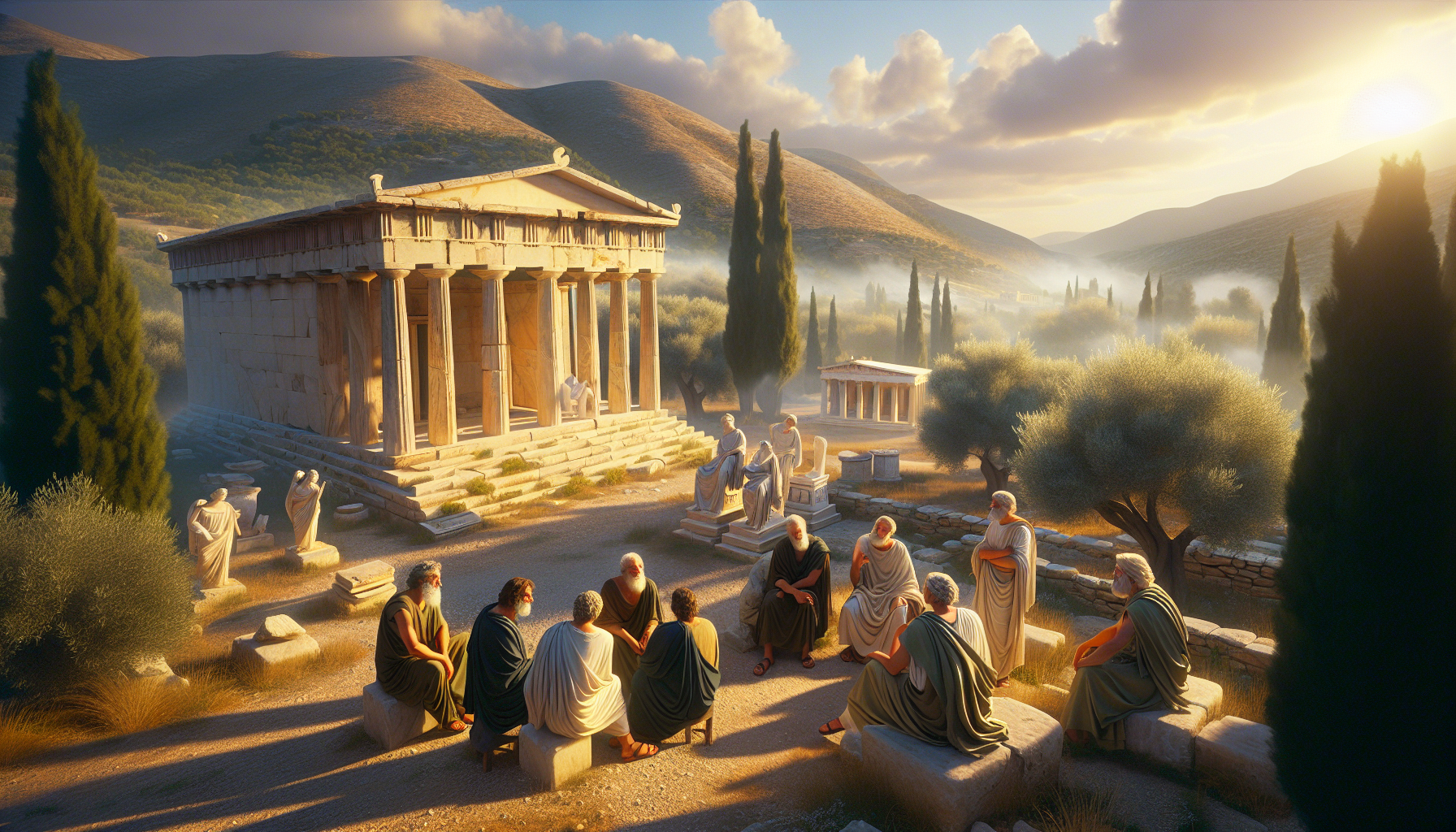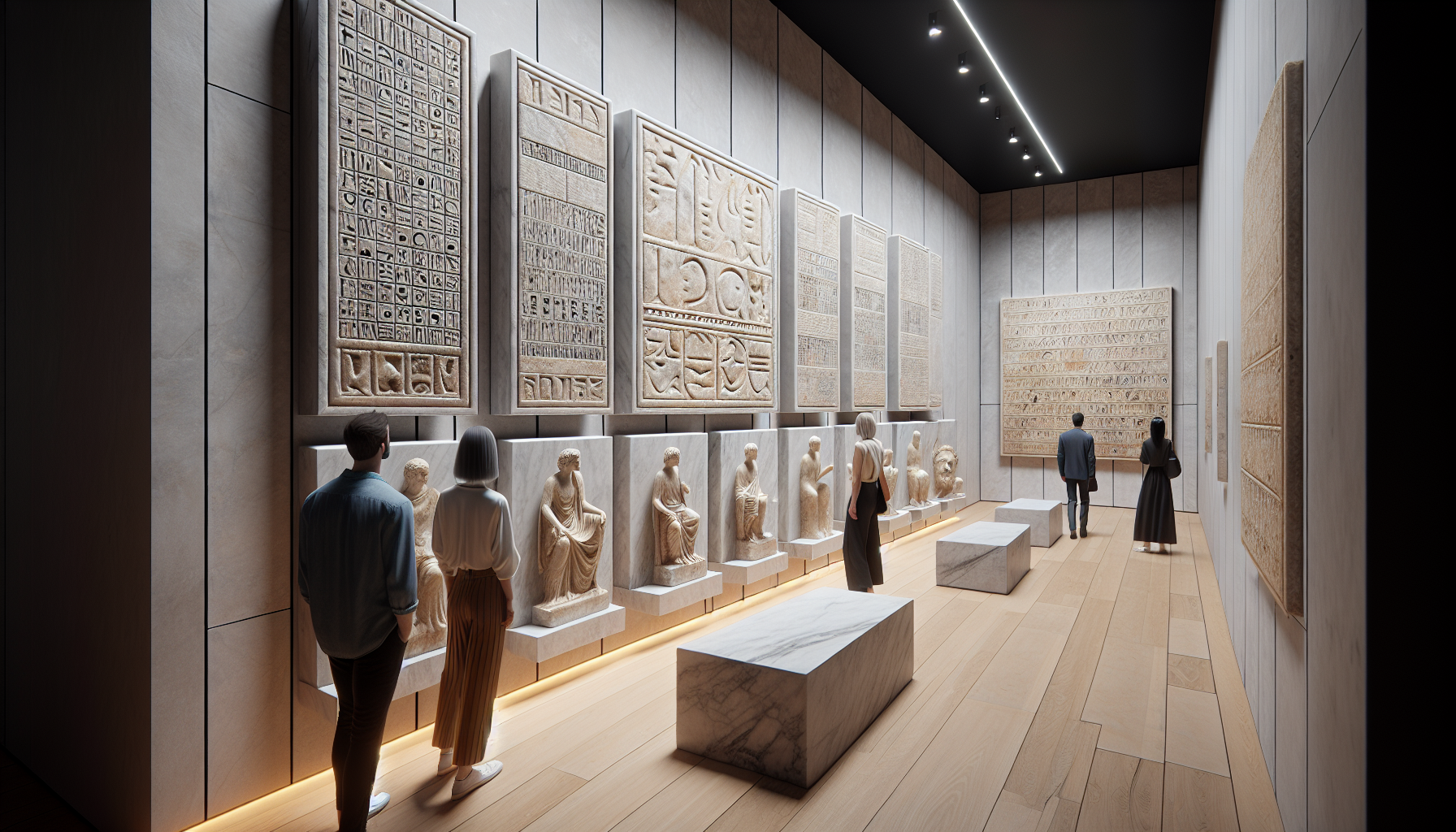In the vast tapestry of human history, few civilizations have left as indelible a mark as that of Ancient Greece. While its towering columns and evocative sculptures continue to inspire awe, there lies a subtler, yet equally profound legacy that often escapes the untrained eye: its language. Welcome to an exploration of the archaic Greek language, a journey that transcends mere words to delve into the essence of a civilization that shaped the very bedrock of Western culture. This is not just a study of linguistic forms; it is an invitation to step into the minds and hearts of the ancients, to hear their stories and feel their passions as they did millennia ago. 🌿
Imagine standing in an ancient agora, the sun casting long shadows as merchants call out in a dialect that is both foreign yet strangely familiar. This was the world of archaic Greek—a vibrant mosaic of regional dialects, each contributing its own flavor to the language that would one day birth the classics of Homer and the philosophies of Plato. As we embark on this linguistic odyssey, we will uncover the unique characteristics that distinguished these regional dialects and explore how they came together to form a cohesive cultural identity. From the melodic Ionian speech that hummed through bustling coastal cities to the austere Dorian dialect echoing in the mountainous heartlands, each variation offers a glimpse into the diverse lives of its speakers.
Yet, this journey is more than an academic exercise; it is a chance to witness the timeless beauty of a language that has influenced countless others and continues to resonate in modern times. Through the lens of archaic Greek, we can better understand the nuanced interplay between language and society, examining how linguistic evolution mirrored shifts in power, trade, and cultural exchange. As we peel back the layers of history, we will reveal the surprising ways in which these ancient words have seeped into our own vocabulary, underscoring the enduring legacy of Greek civilization in contemporary language.
Throughout this exploration, we will also confront the myths and realities of archaic Greek. Was it really as uniform as the ancients might have led us to believe, or was there a rich tapestry of dialectical diversity that challenged the notion of a single, unified Greek language? By examining archaeological findings and historical texts, we will trace the journey of Greek from its Mycenaean origins through the Archaic Period, uncovering the linguistic shifts that mirrored the social and political transformations of the time. Through this, we will gain insights into the role of language as a living, breathing entity, continually adapting to the needs and experiences of its speakers.
As we traverse this ancient landscape, we will meet the poets, philosophers, and statesmen who wielded language with an artistry that continues to captivate audiences today. Their words, whether etched on stone or whispered through the ages, offer timeless insights into the human condition, capturing the joys, sorrows, and aspirations of a people who dared to question, to dream, and to create. In understanding the language they spoke, we bridge the gap between past and present, reminding ourselves of the unbroken thread of humanity that links us to those who walked before us.
Join us, then, on this linguistic adventure through time and space, as we uncover the timeless beauty and regional charms of archaic Greek. Let us revel in the intricacies of a language that, despite the passage of millennia, continues to echo with a vibrancy and relevance that defy the boundaries of time. 🏛️
The Origins of Archaic Greek: Setting the Stage for a Linguistic Odyssey
The Archaic Greek period, spanning from approximately 800 BCE to 480 BCE, marks a pivotal era in the history of the Greek language. It is during this time that we see the emergence of distinct dialects and the refinement of the Greek alphabet, which set the foundation for Classical Greek and influenced many modern languages. Understanding the linguistic developments of this era offers valuable insights into the cultural and social dynamics of ancient Greece. As we embark on this linguistic journey, it becomes essential to appreciate the broader context of Archaic Greek and its regional variations, which together weave a tapestry of linguistic richness and diversity.
Archaic Greek is known for its diversity, with several dialects such as Ionic, Aeolic, and Doric emerging from different regions. These dialects were more than just linguistic expressions; they were emblematic of the distinct cultural identities and geopolitical affiliations within ancient Greece. The Ionian dialect, for instance, was prevalent in regions like Athens and the Aegean Islands, known for their philosophical and artistic advancements. On the other hand, Doric, spoken in places like Sparta and Crete, often reflected the militaristic and austere lifestyle of these regions. To fully understand Archaic Greek, one must delve into the historical and cultural nuances that shaped these dialects and the societies that spoke them.
The Greek alphabet, adapted from the Phoenician script during this period, was a crucial development that facilitated the spread of literacy and literature in ancient Greece. The introduction of vowels, absent in the Phoenician script, allowed for greater precision and expression in writing. This innovation not only enriched the Greek language but also enabled the preservation of oral traditions and the creation of literary masterpieces, such as Homer’s epics. The following table provides a comparative overview of some key characteristics of the Greek dialects during the Archaic period.
| Dialect | Region | Characteristics |
|---|---|---|
| Ionic | Athens, Aegean Islands | Sophisticated, literary; used in Homeric epics |
| Aeolic | Thessaly, Boeotia, Lesbos | Preserves ancient features, poetic; Sappho’s works |
| Doric | Sparta, Crete | Conservative, militaristic tone; Pindar’s odes |
For a more engaging experience, watch this video on the evolution of the Greek alphabet from the YouTube channel “History of Writing”.
Regional Variations: The Dialectical Landscape of Ancient Greece
The Archaic period is marked by a fascinating interplay between various Greek dialects, each representing the unique characteristics of its respective region. These regional dialects not only reflect linguistic differences but also showcase the diverse cultures, political structures, and social norms of ancient Greek civilization. Let’s explore these dialects and understand how they contributed to the linguistic mosaic of Archaic Greek.
Ionic Greek, with its elegance and refinement, was predominantly spoken in the Ionian Islands and the coastal regions of Asia Minor. It became the lingua franca of the time due to its widespread use in commerce and literature. The dialect’s association with Homer’s “Iliad” and “Odyssey” further cemented its place in the annals of literary history. Ionic Greek’s fluidity and adaptability made it the preferred dialect for philosophers and playwrights, influencing the development of later forms of Greek.
In contrast, Aeolic Greek, primarily spoken in regions like Thessaly, Boeotia, and Lesbos, retained more ancient linguistic features. It is known for its lyrical quality, evident in the works of poets like Sappho and Alcaeus. The Aeolic dialect’s rich poetic tradition played a crucial role in preserving the oral traditions of these regions, offering a glimpse into the social and cultural life of its speakers.
On the other hand, Doric Greek, associated with the militaristic and disciplined societies of Sparta and Crete, exhibited a conservative and austere nature. Its distinct phonetic characteristics and vocabulary made it stand out among the other dialects. The Doric dialect was often used in choral odes and was the preferred medium for the compositions of Pindar, known for his victory odes.
The Influence of Regional Dialects on Greek Identity
The existence of multiple dialects during the Archaic period highlights the diversity within Greek society and its decentralized political landscape. City-states, or “poleis,” each developed their dialect as a reflection of their identity and values. This linguistic diversity was both a unifying and divisive factor, contributing to the rich cultural tapestry of ancient Greece while also presenting challenges to communication and unity among Greek city-states.
The dialects served as a source of pride and identity for their speakers, influencing art, philosophy, and politics. For instance, the Athenians’ affinity for Ionic Greek was mirrored in their pursuit of intellectual and artistic excellence, while the Spartans’ use of Doric echoed their focus on military prowess and discipline. As these dialects interacted and evolved, they paved the way for the development of Koine Greek, the common language of the Hellenistic world.
The Legacy of Archaic Greek: From Antiquity to Modern Times
The legacy of Archaic Greek extends far beyond its historical timeframe, leaving an indelible mark on the linguistic and cultural landscape of the Mediterranean and beyond. The innovations in language and literature during this period laid the groundwork for subsequent developments in Greek culture and language, influencing everything from philosophy and science to politics and art. Understanding this legacy requires examining the enduring impact of Archaic Greek on later periods and its relevance in contemporary contexts.
One of the most significant contributions of Archaic Greek is its role in shaping Classical Greek, the language of philosophers like Socrates, Plato, and Aristotle. The dialectical diversity of the Archaic period provided a linguistic richness that was harnessed by these thinkers, enabling them to articulate complex ideas and theories. This intellectual tradition formed the basis of Western philosophy, science, and political thought, echoing through the centuries.
The literary achievements of the Archaic period also left a lasting legacy, with works like the Homeric epics continuing to inspire generations of writers, artists, and scholars. The themes and characters from these texts have been reinterpreted and reimagined in various cultural contexts, showcasing the timeless appeal of Archaic Greek literature. The preservation and study of these texts have also played a crucial role in the development of philology and the humanities.
- The invention of the Greek alphabet during the Archaic period revolutionized written communication, setting the stage for the preservation and dissemination of knowledge.
- The rich oral and written traditions of Archaic Greek provided a foundation for the literary and artistic achievements of subsequent periods.
- The diverse dialects of Archaic Greek influenced the development of Koine Greek, facilitating communication and cultural exchange across the Hellenistic world.
In contemporary times, the study of Archaic Greek offers valuable insights into the origins of Western civilization and the evolution of language. Scholars and enthusiasts continue to explore the linguistic intricacies and cultural contexts of this period, uncovering new perspectives on ancient Greek society. The enduring fascination with Archaic Greek reflects its profound impact on our understanding of history and human expression.
For a deeper dive into the influence of Greek on modern languages, watch this informative video from the channel “Linguistic Journeys” titled “The Greek Roots of Modern Vocabulary” available here.

Conclusion
In conclusion, our exploration of the archaic Greek language and its regional charms has taken us on a remarkable linguistic journey through ancient Greece, illuminating the beauty and complexity of this ancient civilization. Throughout the article, we delved into the origins of the Greek language, tracing its roots back to the Indo-European family and examining how it evolved over centuries. We highlighted the significance of regional dialects, such as Ionic, Doric, and Aeolic, each contributing to the rich tapestry of Greek linguistic heritage.
The distinctiveness of each dialect not only reflects the geographical diversity of ancient Greece but also sheds light on the cultural and historical contexts that shaped them. From the poetic elegance of Ionic to the rugged strength of Doric, and the melodic tones of Aeolic, these dialects offer a window into the lives and thoughts of ancient Greeks, providing invaluable insights into their society, philosophy, and art.
Understanding the archaic Greek language allows us to appreciate the timeless beauty of works by Homer, Hesiod, and Sappho, whose masterpieces continue to resonate with readers today. These literary treasures, composed in their original dialects, carry the echoes of a bygone era, yet their themes of heroism, love, and morality remain universal and relevant. The study of these texts not only enriches our knowledge of ancient Greek literature but also deepens our understanding of human nature and the shared experiences that transcend time and space.
Furthermore, our journey underscored the pivotal role of language in preserving cultural identity. The Greek language, with its regional variations, served as a unifying force among the city-states while simultaneously celebrating their diversity. It facilitated communication and trade, fostering a sense of community and shared values across the Hellenic world. The preservation and study of these dialects are crucial for maintaining a connection to our collective past and ensuring that the wisdom and beauty of ancient Greece continue to inspire future generations.
As we reflect on the linguistic and cultural legacy of archaic Greek, it is essential to recognize its enduring influence on modern languages and civilizations. The contributions of ancient Greece to philosophy, science, politics, and the arts are foundational to Western thought, and their language is a testament to their intellectual and creative achievements. By studying archaic Greek, we not only honor this legacy but also gain valuable tools to understand and engage with the complexities of our contemporary world.
We encourage you, dear reader, to continue this exploration of ancient Greek language and culture. Whether through academic study, travel to historical sites, or simply reading the works of ancient Greek authors, there are myriad ways to immerse yourself in this fascinating world. Share your insights and discoveries with others, fostering a community of learning and appreciation for the rich heritage of ancient Greece. 🌿
In today’s digital age, access to resources and scholarly work is more accessible than ever. Take advantage of online databases, academic journals, and digital libraries to further your understanding of archaic Greek and its regional dialects. For those interested in deepening their knowledge, consider visiting resources such as the Perseus Digital Library (https://www.perseus.tufts.edu/hopper/), which offers a wealth of texts and translations, or the Center for Hellenic Studies (https://chs.harvard.edu/) for scholarly articles and research materials.
Let this journey through the linguistic landscapes of ancient Greece inspire you to appreciate the beauty of language and its power to connect us across time and space. Engage with the past, share your findings, and contribute to the preservation of this invaluable heritage. By doing so, you not only enrich your own life but also ensure that the timeless beauty of archaic Greek continues to illuminate our shared human experience. 🌟
Toni Santos is a visual storyteller and linguistic romanticist whose work explores the silent beauty of dead languages and the cultures they once animated. Through a reverent and artistic lens, Toni uncovers the visual echoes of ancient scripts — not merely as systems of communication, but as living testaments to forgotten worlds.
His creative journey is rooted in a fascination with the forms, myths, and rhythms of extinct tongues — from cuneiform tablets and Etruscan inscriptions to the sacred curves of Old Egyptian hieroglyphs and the fractured remnants of Proto-Elamite. Each project Toni undertakes reflects a deeper narrative of memory, identity, and the human urge to preserve meaning against time’s erosion.
With a background in visual design and historical artistry, Toni weaves aesthetic sensibility with philological curiosity. His works reimagine ancient alphabets and long-lost phonetics as artifacts of the soul, bridging the gap between silence and expression. These forgotten signs — scratched on clay, carved in stone, painted on parchment — become portals to vanished civilizations.
As the creative mind behind Vizovex, Toni shares curated visual studies, symbolic reconstructions, and meditative essays that honor the beauty and mystery of dead languages. Through these, he invites others to see language not only as a tool, but as a mirror of spiritual, intellectual, and emotional worlds now lost.
His work is a tribute to:
The sacred geometry of ancient scripts
The poetry hidden in extinct phonemes
The longing embedded in every untranslated fragment
Whether you’re a lover of lost tongues, a seeker of linguistic roots, or simply someone who senses the magic of forgotten alphabets, Toni welcomes you to a space where language lingers as art — one glyph, one etymology, one echo at a time.





